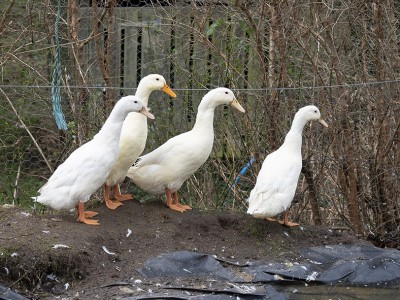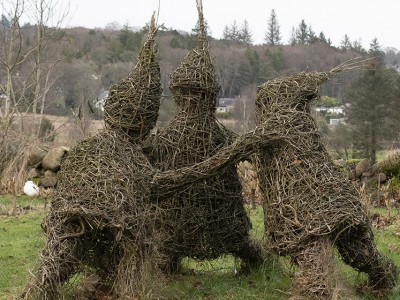All of our therapists are affiliated to the relevant regulatory bodies, and are committed to meeting their exacting standards. A recent review of our therapeutic provision found that each therapist is well qualified, experienced and provides much-valued support to the children and young people here.
Therapy referrals mostly come from our internal multi-disciplinary team meetings which our doctor attends. Our teachers, house coordinators and workshop leaders can also make referral requests, which are discussed in our weekly team meetings. Decisions can then be made as to which therapy or combination of therapies is most likely to meet the needs of the student as detailed in the referral.
We expect our therapies to achieve positive outcomes for every child and young person.
Our therapies:
Therapeutic Art
Therapeutic art supports individuals in expressing their inner world through a holistic, person-centred approach, focused on their particular needs. Upbuilding and harmonising creative processes are used, which might include drawing, painting and modelling from imagination or observation. Counselling, play and mindfulness exercises can be incorporated to enrich the art, encouraging integration and greater self-awareness.
Therapeutic Music
In therapeutic music sessions, children and young people create or experience live music on a wide range of instruments, individually or in groups. Musical activities can be tailored to promote dialogue, and the expression and release of tension. Their musical skills improve and the music evokes a mood or atmosphere, which helps the students to connect to their inner feelings.
Eurythmy Movement
Eurythmy is expressive movement related to the sounds of both language and music. It’s an enjoyable artistic experience. Specific movements can be chosen to suit the needs of the individual students, targeted at physical, mental and emotional health. Results can be general vitality, lower tension levels or anxiety, enhanced coordination and spatial orientation, and improvement in circulation and breathing.
Therapeutic Speech
Therapeutic speech is an artistic therapy that uses elements of speech and drama such as rhythms, sound qualities, dramatic gesture and content as the therapeutic medium. Individual tailored programmes of guided speech and breathing exercises supported by specific movement activities can address developmental, emotional and physical difficulties. We've found it to be beneficial for both verbal and non-verbal students.
Speech And Language Therapy
Speech and language therapy is aimed at students with speech, language and communication difficulties. Targets can be set for all levels of communication including pre-verbal skills, non-verbal and verbal communication, from single word production and comprehension to higher-level processing (problem solving, reasoning).
Therapeutic Exercises
Therapeutic Exercises involve aspects of movement, flexibility, rhythm, balance, coordination, concentration, sensory integration and play. Gentle workouts and exercises involving balance are practised to help students feel more grounded and present, which may help to lower anxiety and tension. Through becoming more conscious of their own movement, participants achieve greater skill and self-control. The therapy also aims to develop a sense of competence as a driver for further development and self-confidence.
Massage Therapy
Rhythmical massage therapy (RMT) is a remedial form of massage that uses a gentle, rhythmical, breathing quality of touch, which can penetrate the tissues deeply. The oils and ointments are specifically chosen for each student. A massage session is followed by a therapeutic rest. RMT harmonises breathing, eases muscle tension and increases the sense of well-being. Physical and emotional development is supported through strengthening of healthy rhythmical processes within the body. It can be used to address sleep disturbances, respiratory conditions, headaches, constipation and metabolic disturbances, rheumatic disorders and neurological conditions.
Play Therapy
Play therapy helps children express their inner feelings and emotions. In an imaginative, safe and child-led way, they can act out their concerns and fantasies. The therapist reflects aspects of the play process back to the child, which can improve self-awareness.
Bath Therapy
The baths are given at a specific temperature with specially chosen substances, usually oils, dispersed in the water. The student is immersed in the water allowing the skin to absorb the substance, and rests after the bath. The baths have a wide range of benefits, for example stimulating the body’s warmth, improving blood circulation, boosting the immune system and supporting the experience of the bodily boundaries. They help physical and emotional well-being.
Equine Therapy – Riding Therapy, Hippotherapy and Equine-Assisted Therapy
These therapies are based on bringing together horses and young people to promote emotional growth and learning. The riding therapy develops riding skills and confidence. Hippotherapy is bareback riding, on a blanket only, so that the horse’s movements can be felt by the rider to improve posture, awareness and rhythm. Equine-assisted therapy focuses on various exercises with the horse, such as leading the horse round a series of obstacles without a lead rope, and care management of the horse such as grooming, shoeing and feeding.
Working with horses can help people discover more about themselves, develop skills and find new ways of thinking. It’s particularly beneficial for the student’s confidence, memory and concentration, communication and relationships, balance and coordination.


